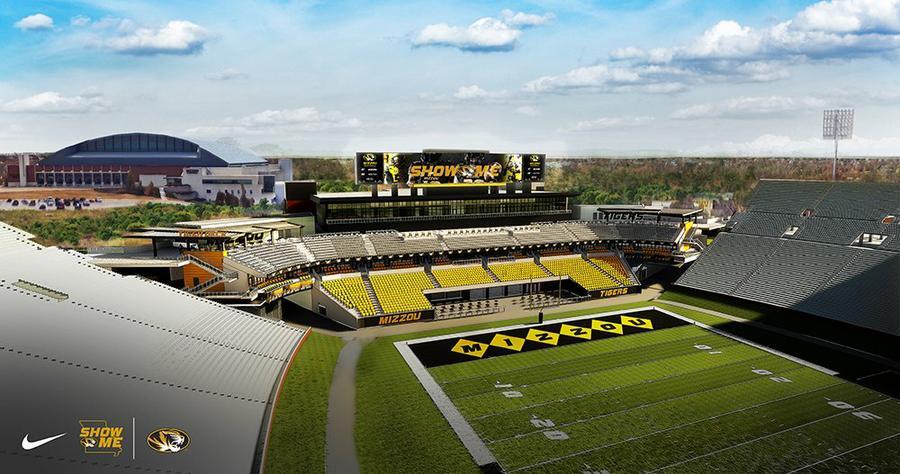
The UM System Board of Curators approved the Memorial Stadium South Expansion project Friday morning.
The stadium expansion will begin infrastructure construction during the upcoming football season, and will be completed in time for the 2019 season. It is estimated to cost $98 million and was approved unanimously by the Finance Committee and the Board of Curators after a unanimous vote to re-appoint the board’s committees.
The idea of a new south end zone building first came up in 2008, and a master plan was issued to HOK, an architecture firm, in 2010, said Athletic Director Jim Sterk at the Friday meeting. The firm currently carrying out the project is Populous Inc., based out of Kansas City, which was hired in February.
Sterk and Ryan Rapp, vice president of finance and chief financial officer of the UM System, presented the project to the board, recapping Mizzou Athletics’ finances for fiscal year 2018 before providing an overview of the project’s timeline and funding.
Over half of the project’s funding is projected to come from $50 million in donations from 42 donors, Sterk said. The remainder will come from long-term debt paid off from premium seat ticket sales.
Sterk made his case to the board as to why the expansion would help MU as an institution, as well as within the Southeastern Conference.
“This project is one that will help us jump in that [SEC] ranking … and help us be more competitive within the league,” Sterk said. “Being able to compete not only with the SEC but nationally — I think this allows us to keep on par in a great way, allows Barry [Odom] to be competitive with recruiting and allows our student athletes the latest in facilities.”
The project will also help the football program, the most profitable sector of Mizzou Athletics.
“What we’re doing here is protecting our most valuable asset in athletics, which is football,” Curator Phillip H. Snowden said. “Out of our $100-million budget, and $90 million of it comes from revenue that football provides. … We’re enhancing not only football and our brand around the country, but we’re supporting the student athletes at the university.”
Ticket revenue in the end zone is projected to increase nearly sixfold with the project.
“Currently, we generate about a million and a half dollars there throughout the season,” Sterk said. “Now we’re estimating that we can generate upwards of $6 million in that end zone.”
Sterk added that despite any debt the project will incur, concerns of the university’s credit rating should not be at the forefront of discussion.
“Our credit rating really shouldn’t drive our strategy,” Sterk said. “We’re an AA1-rating institution … If there was an impact, it wouldn’t be driven by this project.”
_Edited by Olivia Garrett | [email protected]_